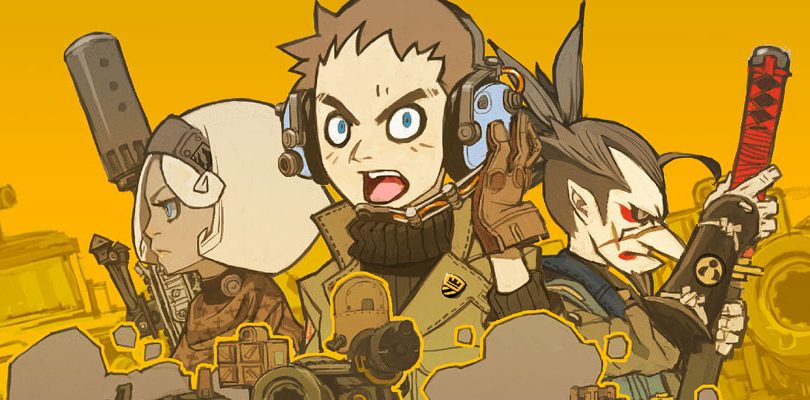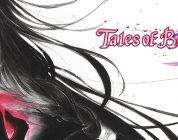Lo scorso dicembre ha debuttato su PlayStation 4, Nintendo Switch e PC un nuovo titolo esclusivamente in formato digitale dal sapore strategico, giunto all’interno del panorama videoludico come una sorta di sequel spirituale di Advance Wars. Parliamo ovviamente di TINY METAL, gioco che abbiamo avuto il piacere di recensirvi, e oggi addirittura di intervistare il suo sviluppatore: AREA 35.
Per questa intervista abbiamo selezionato e posto sei interessanti domande al team di sviluppo, e queste sono le risposte che sono gentilmente riusciti a darci.
TINY METAL – Intervista agli sviluppatori
Il vostro primo gioco ricalca in qualche modo le atmosfere della saga Advance Wars. Avete amato particolarmente questa saga? Pensate che Nintendo possa riportarla sulle console, magari spronati dal vostro lavoro?
R: Amiamo questa serie. Abbiamo deciso di creare TINY METAL perché consapevoli delle difficoltà per Intelligent Systems di riportare in vita la saga, ma sarebbe davvero stupendo se decidessero di mettersi a lavoro su un nuovo Advance Wars!
Una delle cose che abbiamo maggiormente apprezzato in TINY METAL è sicuramente la splendida soundtrack realizzata da Tomoki Miyoshi. Con quali altri celebri artisti della scena videoludica vorreste collaborare per un progetto futuro?
R: Grazie! Tomoki ha fatto davvero un lavoro fantastico con la soundtrack del gioco, che verrà presto resa disponibile. Non credo che coinvolgeremo altri artisti, ma ci terrei a far notare che già tantissimi grandi sviluppatori hanno lavorato a TINY METAL da dietro le quinte, e potete scoprirli solo tramite i riconoscimenti! L’unico dettaglio che purtroppo ci è mancato è stato un cospicuo budget con cui lavorare, e per questo motivo abbiamo dovuto porci alcuni limiti, per cui speriamo che in futuro si possa riuscire a creare insieme qualcosa di ancora più bello!
La canzone di un popolare artista italiano recita: “Il secondo album è sempre più difficile nella carriera di un’artista”. Avete già qualcosa in mente per il vostro prossimo titolo? Potreste darci qualche informazione?
R: Abbiamo ancora Project Phoenix da realizzare e sì, sebbene possa essere un grande progetto, qui ad AREA 35 abbiamo tutto il personale necessario e adoriamo le relazioni con i migliori freelancer nipponici e occidentali. Più grande sarà il progetto, più facile diventerà per noi.
Al momento, crediamo che TINY METAL sia stato il progetto più difficile da completare per via delle risorse limitate con cui abbiamo dovuto lavorare. Tutto questo ha richiesto una certa intelligenza da parte nostra nel capire come spendere i fondi.
Detto questo, Project Phoenix sarà qualcosa di fantastico, e per noi sarà una divertente sfida riuscire a consegnarlo ai giocatori di tutto il mondo.
Lavorare nella scena indie risulta particolarmente difficile in confronto ai lavori delle grandi case, oppure è totalmente diverso?
R: È davvero tanto diverso. Molti di noi hanno lavorato solamente con grandi compagnie, e le dimensioni delle varie operazioni che ci siamo ritrovati ad affrontare hanno rappresentato una discreta sfida. Nonostante siamo veterani, e abbiamo addirittura lavorato anche a titoli tripla A, rispettiamo moltissimo gli studi di giochi indipendenti, dal momento che riescono ad essere intelligenti e adattarsi al proprio ambiente di sviluppo.
In un certo senso siamo quasi come le forze speciali. Abbiamo il miglior equipaggiamento ed esperienza possibile. Ovviamente, siamo anche in grado di svolgere al meglio i nostri compiti perché riceviamo il supporto di tantissime persone e siamo designati a compiere il tutto nel miglior modo possibile. Se ci dovessimo supportare da soli, senza poter lavorare con il miglior equipaggiamento, esperienza e intelligenza, ci ritroveremo in un posto ben diverso.
TINY METAL ha avuto qualche problema al lancio, ed è stato anche rimosso temporaneamente dagli store. Che tipi di feedback avete ricevuto per il gioco? Quali novità implementerete in futuro?
R: Fortunatamente abbiamo ricevuto molti feedback riguardanti bug, bilanciamento e idee varie. Abbiamo suddiviso il tutto in ordine di priorità e attualmente stiamo pianificando di implementare quanto più possibile ci permetta di fare il budget a nostra disposizione. Continueremo comunque a lavorarci, e aggiungeremo anche altri contenuti. Non abbiamo ancora finito con il gioco!
Pensate che la scena videoludica si sia ampliata in termini di divertimento rispetto al passato, o sia succube delle grafiche in HD tralasciando il vero significato di divertimento?
R: Non credo sia solo divertimento, e neanche il focalizzarsi sulle grafiche in alta definizione. Penso che tantissimi creatori di giochi abbiano dimenticato come sia ritrovarsi dentro al gioco, di come il giocatore possa diventare parte di questo. Ci sono tantissimi titoli che non godono di un buon gameplay, ma dove gli utenti riescono comunque a divertirsi in diversi modi.
Aumentare semplicemente la qualità di un solo aspetto del gioco è davvero diverso dal comprendere i veri requisiti che necessitano a un titolo per essere considerato avvincente. Per esempio, la serie METAL GEAR ha un buon bilanciamento che permette agli utenti di essere “nel” gioco. Magari può non avere il miglior gameplay o un buon metodo di narrazione della storia, ma riesce a infondere quel tipico feeling “questo titolo è davvero bello, devo continuare a giocarlo!”. Chiedo davvero scusa di non essere in grado di spegarmi al meglio, ma spero davvero si sia capito il concetto!
Ringraziamo davvero di cuore AREA 35 per la disponibilità offerta in questa intervista, e non possiamo fare altro che augurargli il meglio possibile per il futuro!
English Version
TINY METAL – Developer Interview
AREA 35’s first game followed the steps and tried to recreate the atmosphere of the Advance Wars saga. Did the company love this particular series? It would be possible for Nintendo to revive Advance Wars thanks to your work?
R: We love this series. We decided to make TINY METAL because we know it is difficult for Intelligent Systems to revive the work, but by all means, it’d be super awesome if they worked on the next Advance Wars!
One of the things I’ve really appreciated in TINY METAL is certainly the amazing soundtrack composed by Tomoki Miyoshi. Which other famous and talented videogame artists would you like hire for a future project?
R: Thank you! Tomoki has certainly come a long way and he has done a fantastic soundtrack for us which will be available soon. I don’t think we’ll be bringing on any other artists, but I do want to note that we’ve already got a ton of great developers who’ve worked on some super famous games working on TINY METAL behind the scenes, so be sure to check out the game credits! The only unfortunate thing is we didn’t have a huge budget to work with and they had to work with some limitations, so hopefully in the future, we can get something even more awesome done together!
A popular italian song says “A second album is always difficult in an artist career”. Did the team have already something on his mind for his next game? If possibile, can you share with us some detail?
R: Well we do have Project Phoenix to do, and yes, that is a huge undertaking but at AREA 35, we have everyone we need and we enjoy a great relationship with Japan and the West’s best freelancers. The bigger the project gets, the easier it is for us.
We actually think TINY METAL was the most difficult because of the limited resources we were working with. We had to be very smart about how to spend money.
That all been said and done, Project Phoenix is going to be a blast and it’ll be an enjoyable challenge to get it out to the whole world.
Working in the indie scene can be quite difficult compared with big companies, or it’s totally different?
R: Very, very different. Most of us have only worked with big companies, and this size of an operation was very challenging for us. Despite the fact that we’re veterans having worked on many triple A titles, we have a huge amount of respect for independent game studios as they are smart and adaptive to their development environment.
In a way, we’re almost like the Special Forces. We get the best equipment and training. Of course, we’re going to perform the best because we get supported by hundreds of people and we’re designed to perform well. If we had to support ourselves, not working with the best equipment, training or the intelligence, we’d be sitting at a very different place.
TINY METAL had some problems at launch, and it was momentarily removed from the shop. Which kind of feedback the players gave to the game? What are you planning to implement in the near future?
R: We received, thankfully, a lot of player feedback in regards to bugs, balance and ideas. We’ve categorised them in order of priority and we’re planning to implement as much as we can within our budget. We are going to continue working on this, and also add content. We’re not quite done with the game, so stay tuned!
Do you think that the videogame scene became bigger in terms of fun compared to the past, or it is under thumb of HD graphics forgetting the real meaning of fun itself?
R: I don’t think it’s just fun, or even the focus of HD graphics. I think a lot of creators forgot how to be “in” the game, for the player to become part of it. There are plenty of games which don’t have good gameplay but gamers enjoyed in different ways.
Just upping the quality of one aspect of the game is very different to understanding what is required for the game to be engrossing. For example, the METAL GEAR series has a great balance for people to be “into” the game. It may not have the best gameplay, or a great storytelling method, but it instills a sense of “This game is great, I have to keep playing!” feeling. My apologies for not being able to explain this better, but I hope you understand!
Thanks to AREA 35 for this opportunity. We really hope all the best possibile for the company future
 Resta aggiornato: iscriviti al canale Telegram
Resta aggiornato: iscriviti al canale Telegram




